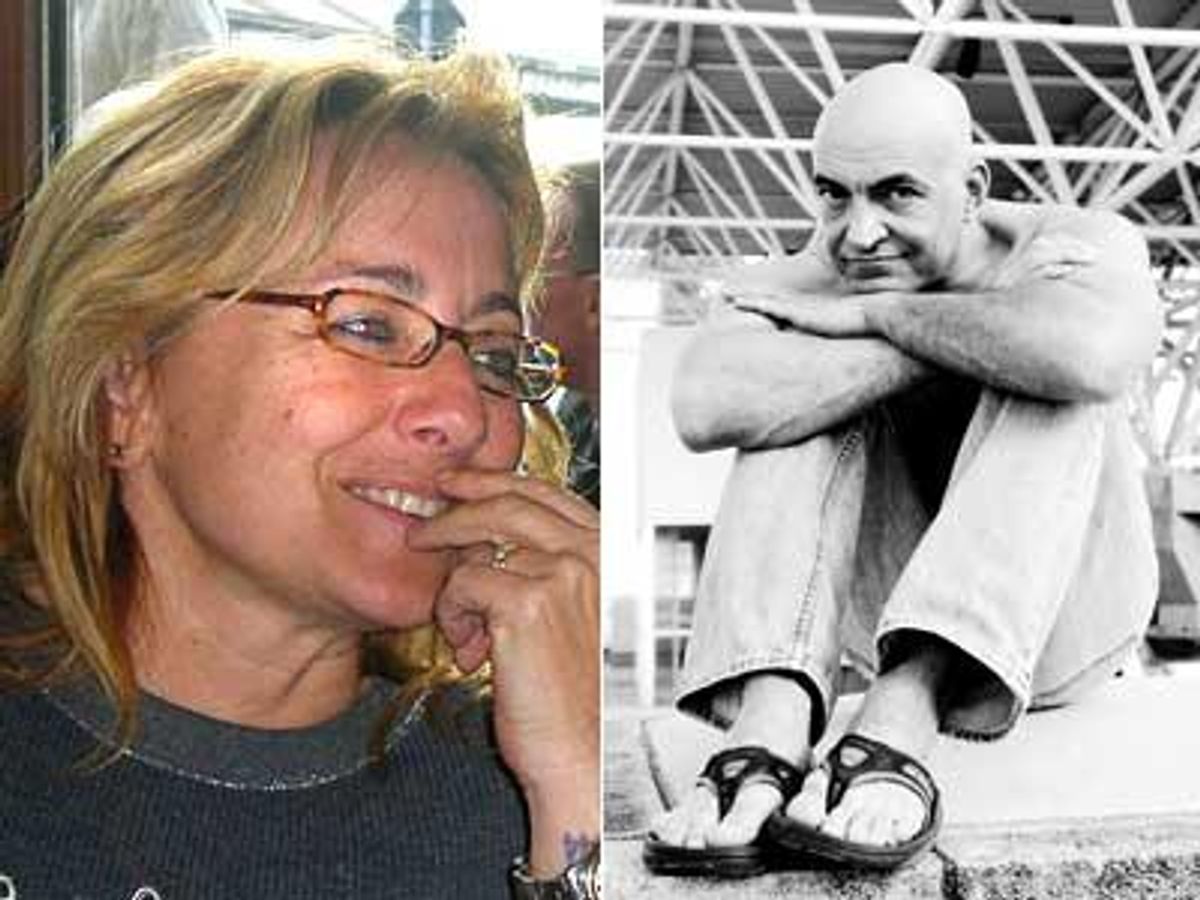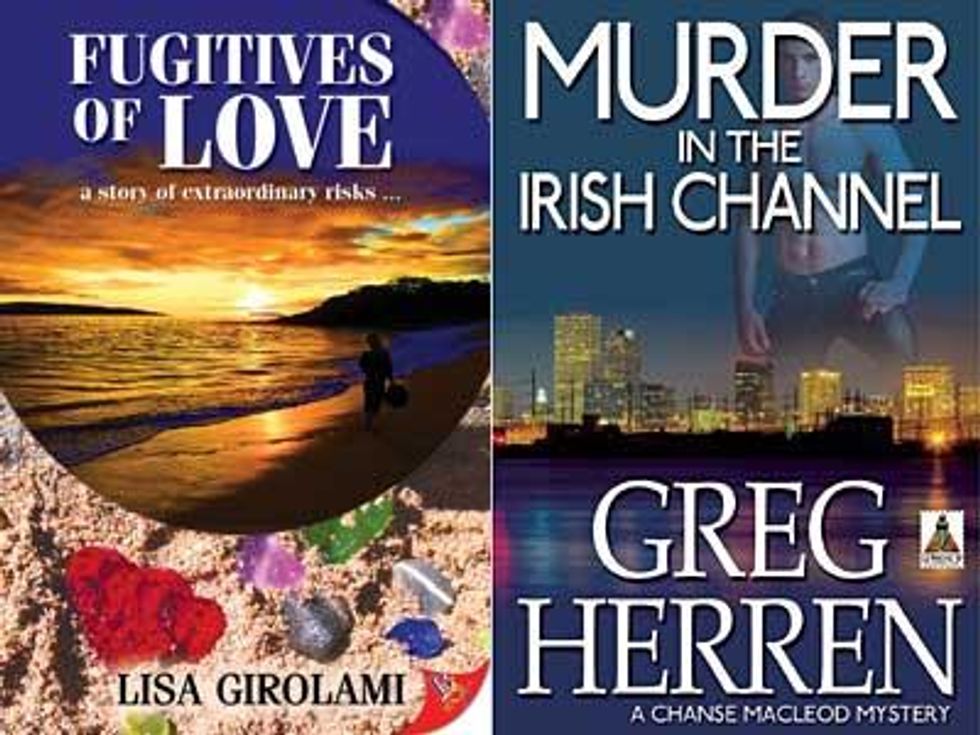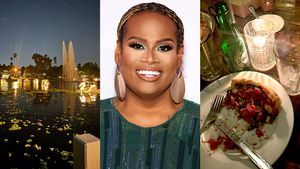Long before Lisa Girolami began her career as a lesbian novelist she was working in the entertainment industry, where she spent 30 years, including 10 years as a motion picture production executive and two decades producing and designing theme parks for Walt Disney and Universal Studios. The author of four novels (including the recent Fugitives of Love), the Long Beach, Calif.-based Girolami sat down recently to chat with her Bold Strokes Books label mate, Louisiana's Greg Herren, the award-winning author of 17 novels (including Murder in the Rue Chartres) and editor of 12 anthologies (such as the award-winning Love, Bourbon Street: Reflections on New Orleans). In addition to writing, Girolami is also a counselor for LGBT clients, and Herren, who lives in New Orleans with his partner, works as an HIV counselor/researcher.
Girolami: Other than a few emails back and forth, I haven't talked to you since we were on our hunt for Beaver Pond in the Adirondacks [during a retreat for Bold Strokes Books authors]. You were such a champ to accompany a bunch of us lesbians in our pursuit of that elusive body of water. Took us two days of hikes to finally find it, as I remember.
Herren: Yes, it took two days of trailblazing through the wilderness, but I had full confidence in my lesbians' ability to find the Beaver Pond.
Girolami: It took us two days of bushwhacking, pardon the intended pun, but we finally found it. I think that's what's so great about our family of authors at Bold Strokes Books. I mean, and this is truly not a brown-nosing moment, all of the authors support each other so much. When my first novel was accepted, I knew nothing about the publishing business. I thought it would be really competitive and that the authors wouldn't socialize and encourage each other because of the need to keep their own sales protected. Maybe it's because I'm in the entertainment business. I've spent over 30 years producing motion pictures and theme parks, and it can be super-competitive and protective. We don't help the competition! But there's none of that at BSB. I help other authors and they help me. Do you think it's part of the gay community notion that sometimes it's not so much the family you're born into but the family you make?
Herren: While I have been surprised over all how welcoming the publishing community is -- I've had so much help from so many authors and editors over the length of my career -- BSB is rather unique in that the publisher creates a sense of community with its authors, which I've never experienced at a publisher before, and BSB is the fourth or fifth publisher I've worked with. Not that the other publishers weren't good experiences, but there wasn't a sense of community with the authors. I always dealt with my editor, copy editor, etc., only -- not with other authors. And there's a sense of isolation there. Fortunately, I live in New Orleans, where there are lots of literary events annually and lots of local authors, so I've always have a very strong support system. I remember one day I had lunch with Julie Smith, ran into Poppy Z. Brite in the grocery store, bumped into Nevada Barr at the bookstore, and had dinner with J.M. Redmann. So there you go. I'm pretty lucky.
 Girolami: I'd call that a great day. It's funny that most authors I know are fairly gregarious, which is such a paradox given that the job of writing is such a solitary endeavor that takes hours, weeks, and months per novel. When I see my fellow authors I'm reminded of a cloistered convent where, one day a week, they are allowed to talk, and it's a cacophony of cackle. Wow, I just compared gays and lesbians to nuns. Did I just hear thunder? So I'm curious, Greg, if you could have written an existing novel or film screenplay, which one would it be and why?
Girolami: I'd call that a great day. It's funny that most authors I know are fairly gregarious, which is such a paradox given that the job of writing is such a solitary endeavor that takes hours, weeks, and months per novel. When I see my fellow authors I'm reminded of a cloistered convent where, one day a week, they are allowed to talk, and it's a cacophony of cackle. Wow, I just compared gays and lesbians to nuns. Did I just hear thunder? So I'm curious, Greg, if you could have written an existing novel or film screenplay, which one would it be and why?
Herren: Wow, I've never been asked that before. Since William Goldman wrote the book and the screenplay for the movie, I am going to say The Princess Bride -- that way I can claim both. What about you, Lisa? And what made you decide to write lesbian romances?
Girolami: The simple answer is that I wanted to read stories about women loving women and there weren't many available when I was younger. I read Rita Mae Brown's Rubyfruit Jungle in 1973 and The Well of Loneliness by Radclyffe Hall around the same time, but I was starved for more. Libraries didn't have a gay section then and there was no Internet, so I felt like I was on an island. So I began to write stories that I'd want to read. Along the way, I discovered Naiad and my library and happiness at finding lesbian books grew. I finished writing my first full-length novel in 1984, but that one is still on my shelf. Eventually, I had another four written and sent one off to Bold Strokes Books. I went under contract shortly thereafter and it's been a fantastic experience ever since. And now I get emails from people saying the same things I was crying out many years ago: "I'm so happy to have found your book." "Now I know there are people like me out there and I don't feel so alone." That's the best reward for writing I could ever imagine. And you? What made you decide to write lesbian novels? Just kidding -- gay novels?
Herren: I've considered writing lesbian novels, actually. I don't know that writing about gay characters was a conscious decision for me. I think it was more that it was easier for me to write about gay men in the beginning since I was one. I do know that I was really surprised to find that there was little to no gay male fiction set in New Orleans -- the city has been written about in almost exhaustive detail, but there was none from an actual gay male perspective. So I tried to fill that void. Nothing pleases me more than hearing that I get New Orleans right or when someone tells me they read one of my books and it made them feel like they were here.


 Girolami: I'd call that a great day. It's funny that most authors I know are fairly gregarious, which is such a paradox given that the job of writing is such a solitary endeavor that takes hours, weeks, and months per novel. When I see my fellow authors I'm reminded of a cloistered convent where, one day a week, they are allowed to talk, and it's a cacophony of cackle. Wow, I just compared gays and lesbians to nuns. Did I just hear thunder? So I'm curious, Greg, if you could have written an existing novel or film screenplay, which one would it be and why?
Girolami: I'd call that a great day. It's funny that most authors I know are fairly gregarious, which is such a paradox given that the job of writing is such a solitary endeavor that takes hours, weeks, and months per novel. When I see my fellow authors I'm reminded of a cloistered convent where, one day a week, they are allowed to talk, and it's a cacophony of cackle. Wow, I just compared gays and lesbians to nuns. Did I just hear thunder? So I'm curious, Greg, if you could have written an existing novel or film screenplay, which one would it be and why?















































































